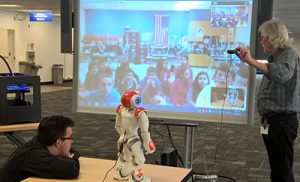Desiree Langbeen, a fourth grade teacher at Balfour Elementary School in Asheboro, North Carolina, and Assistant Professor Michael Wolter, Program Director for Goodwin College’s Management & Leadership program, have been best friends since childhood and consider each their “adopted sibling.” At a winter family get together, Desiree shared how her school had created a Robot Club for fourth and fifth graders. Balfour, part of a small city district, is 92% free and reduced lunches, which means that the school qualifies for Title 1 funding that helps low income, high poverty populations with extra resources to increase student achievement and roughly a 45% English Language Learners population. The district has been implementing STEM activities into schools for the last several years. The Robot Club began as an enrichment program and currently includes 20 students.
 The Asheboro school district has been working to increase the exposure to technology for K-12 students. All high school students are issued a laptop through a grant-funded program hopefully extending to the middle schools in the future. Grade three to five classrooms are equipped with laptop carts, as well as a full weather station manned and operated by second and fifth grade students in conjunction with their science curriculums. The school district hosts an annual fair where students create and present projects that incorporate math and technology. These initiatives support the district’s vision to create 21st century college-ready students.
The Asheboro school district has been working to increase the exposure to technology for K-12 students. All high school students are issued a laptop through a grant-funded program hopefully extending to the middle schools in the future. Grade three to five classrooms are equipped with laptop carts, as well as a full weather station manned and operated by second and fifth grade students in conjunction with their science curriculums. The school district hosts an annual fair where students create and present projects that incorporate math and technology. These initiatives support the district’s vision to create 21st century college-ready students.
The Robot Club is being conducted in conjunction with Desiree’s National Boards application, fulfilling her science/math requirement of the application process. The academic team that she leads, including Sarah Tonkin and Brooke Forrest, chose robots because they wanted to appeal both to boys — who generally are focused on soccer — and to girls to increase their exposure to math and science-related topics. The goal was to engage students in critical thinking by having them collaborate in teams to design and build a robot. The group comprises seven special education students and 13 ELL students, many of whom do not have the opportunities to work with projects of this nature.
Mike talked with Desiree about Goodwin’s Manufacturing program, which houses NAO (the program’s robot) and a 3D printer and includes a faculty member skilled in operating a Quadcopter, a small version of a drone. Both Mike and Desiree saw an amazing opportunity to get her students excited about the Robot Club and to experience three programmatic showcases. Since bringing the Goodwin faculty and equipment to North Carolina was not feasible, Mike recommended using Skype through the new Business and Manufacturing Center’s mobile SMART Board and the SMART Board in Desiree’s classroom. Students could talk with Goodwin’s faculty, see the 3D printer and Quadcopter in action, and “interact” with NAO. Dr. Cliff Thermer, Chair of Goodwin’s Social Science, Business, and Education department, and Desiree’s supervisor at her school both supported the idea.
On March 25, Desiree and her students Skyped into Goodwin’s “Open Classroom” space for a virtual learning session. Mike demonstrated NAO’s capability; Chip Thermer explained how the 3D printer worked; and “Pilot Steve” Socolosky showed off his piloting skills through the Quadcopter. Following the short demonstration, Mike, Steve, and Chip fielded countless questions from the excited North Carolina students about technology, the robot, the printer, the Quadcopter, and about college in general. Desiree later reported to Mike how engaged and talkative her students had been following the demonstration.
The Goodwin faculty members equally enjoyed in their interaction with the fourth and fifth graders. This initiative is something both schools hope to do again in the future to promote technology and math to elementary students.
Goodwin University is a nonprofit institution of higher education and is accredited by the New England Commission of Higher Education (NECHE), formerly known as the New England Association of Schools and Colleges (NEASC). Goodwin University was founded in 1999, with the goal of serving a diverse student population with career-focused degree programs that lead to strong employment outcomes.

